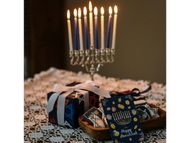Two of the most popular wintertime celebrations are Hanukkah and Christmas, but how frequently do they coincide?
The first night of Hanukkah has coincided with Christmas only five times since 1900: in 1910, 1921, 1959, 2005, and currently in 2024. Beginning on the 25th day of the Jewish month of Kislev, the first night of Hanukkah varies from year to year due to the Jewish calendar's reliance on a lunar calendar, which is based on the moon's orbit around the sun.
Elie Weinstock, president of the New York Board of Rabbis, points out that although Hanukkah can start as early as Thanksgiving, Jewish custom dictates that festivals must occur during specific seasons, therefore the Festival of Lights always occurs in the winter.
He told CBS News in a statement: "The goal is not proselytizing; it's learning deeply from each other."
He continued: "It's others seeing you as you see yourself."
How don't Christmas and Hanukkah coincide every year?
According to the Jerusalem Post, the reason why the two holidays don't coincide is because the Hebrew Calendar differs greatly from the Gregorian Calendar, which is the main dating method used in the West.
Unlike the 365-day solar calendar, which is based on the Earth's rotation around the sun, the lunar calendar lasts roughly 354 days. The eight-night celebration of Hanukkah will begin eleven days earlier each year due to the lunar calendar's shortening.
Both Christmas and Hanukkah emphasize the need for more goodness and peace in the world, despite being observed by different religions.
About Hanukkah

According to Henry Ford College, Hanukkah is customarily observed to commemorate the Maccabees, a band of Jewish warriors who overcame the Greek-Syrian army and took back the Second Temple in Jerusalem in the second century BC.
Hanukkah, which is also known as Chanukah or other Hebrew transliterations, is the "festival of lights" in Judaism. Jews get together with family and friends to light one extra candle in the menorah, a multi-branched candelabra, on eight successive nightfalls.
Hanukkah, which translates to "dedication" in Hebrew, commemorates the rededication of the Jerusalem Temple in the second century BC, following its liberation from foreign occupiers by a small band of Jewish warriors.
They lit the menorah with the small amount of ceremonially pure oil they discovered in the temple, and it remained ablaze for eight days. The custom of burning a candle every night and the focus on preparing meals in oil, such as latkes, which are potato pancakes, honor this oil's extraordinary durability.
Is Hanukkah celebrated differently by different people?
The notion of bringing light into the dark and highlighting the transformative power of even a little, unconventional endeavor is shared by Jews of all religious observances, including Orthodox, Conservative, and Reform.
Because of this, most people begin with one candle and add one more each night while reciting or singing special blessings, despite the Talmud showing a disagreement over the lighting order.
The newest light is always lighted first since the candles are lit from left to right on the menorah but added from right to left. The shamash, the candle from which all other candles are lit, occupies the ninth branch of the particular menorah used during Hanukkah.
Although some people use electric candles for safety reasons in public displays, such as those in hospitals, the custom still calls for candles with a real flame.
